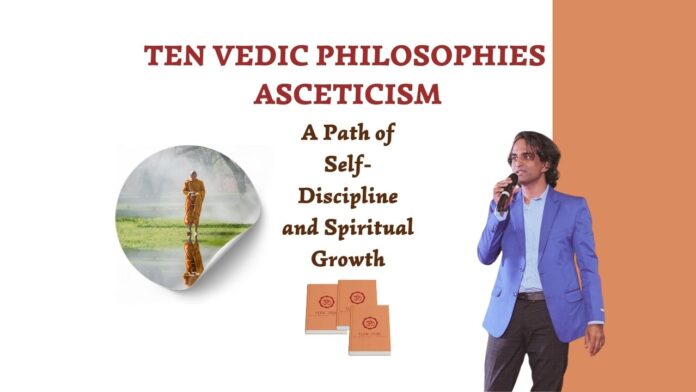Is asceticism relevant for modern lifestyle?
In our previous article, we discussed the first philosophical idea of “altruism” and in this article, we will discuss the philosophical idea of “asceticism”.
Asceticism, a practice rooted in various spiritual traditions, involves the voluntary renunciation of material pleasures and comforts to achieve spiritual enlightenment or self-purification.
It’s a path of self-discipline, characterized by rigorous practices and a commitment to a simple, austere lifestyle.
In this article, we will discuss asceticism in Vedic tradition and how it can be adopted in our modern life.
Asceticism in Vedic Tradition
For the renunciant: In Vedic tradition, asceticism can be either part of routine ritual or a lifestyle itself. For those who choose to renounce worldly affairs, asceticism is a lifestyle itself. They may live as hermits, wandering monks, or members of religious orders, practicing rigorous disciplines like fasting, meditation, and celibacy. But this is not easy for public at large.
For the householder: For a common man, Vedic tradition demands “niyama”. It is part of daily ritualistic practices (like sandhyavandana) and seasonal observances (like vratas). The tradition demands that the Sadhaka observe asceticism for specific duration in a day and also at certain intervals. One can learn these practices from Gurus of their tradition and adopt in their daily life.
In Yoga sutra: Patanjali explains “ashtanga yoga” (eight limbed yogic process) in which the second limb is “niyama”. In the Yogic tradition, niyama refers to a set of ethical practices that complement yama (ethical restraints). These practices (explained in succeeding paragraph), are essential for spiritual growth.
Avadhuta: In Vedic tradition, those who do not adopt “sanyasa ashrama” (formal and methodical renunciation) but behave completely indifferent to worldly affairs are called “avadhuta”. They neither appear as monks nor involve in worldly affairs like a householder. In Bhagavata Purana, Jada-Bharata is the best example of such avadhuta. Bharata, the evolved soul, was mute, seemingly dull and unintelligent. His family considered him a burden, giving him menial tasks and little respect. Despite this, Bharata remained detached from worldly desires, his mind often lost in contemplation of his past lives and spiritual contemplations. He led a life of Avadhuta and attained liberation. His story teaches us that true wisdom can be found in the most unexpected places and that outward appearances can be deceiving.
Asceticism in Modern Life
While the traditional ascetic lifestyle may not be feasible for most people in today’s world, we can still incorporate elements of asceticism into our daily lives. By practicing moderation, self-discipline, and mindfulness, we can cultivate inner peace and spiritual growth.
Here are some practical ways to adopt ascetic principles in modern life:
Practice “Yama” of Patanjali Yoga Sutra: You can progressively adopt and practice five “yama”: Non-violence, truthfulness, non-stealing, chastity, and non-possessiveness. This leads to an ascetic life within the worldly lifestyle and ultimately to spiritual insights.
Practice “Niyama” of Patanjali Yoga Sutra: You can progressively adopt and practice five “niyama”: Cleanliness of body, speech & mind, contentment, austerity, self-study and surrender to divine. This helps you lead a spiritual lifestyle without compromising on your worldly affairs.
Take Deeksha: In Vaishnava tradition, “Dasa Deeksha” is a formal initiation ceremony that marks the beginning of a disciple’s spiritual journey under the guidance of a guru. The “Deeksha” empowers the disciple with the blessings of the guru and the divine, enabling them to practice “asceticism” as a part of their daily life. Deeksha like these do not require the Sadhaka to renounce the worldly affair, but demands a strict discipline. Similarly in Shakta tradition, specifically Sri Vidya tradition, the core of the Deeksha is the transmission of the Shodashi Mantra, a powerful 16-syllabled seed mantra.
By practicing asceticism in a balanced and sustainable way, we can enhance our spiritual journey and improve our overall well-being.
In the next article, we will discuss the philosophical idea Compatibilism.
Madhwesh K
Vedic Tribe

